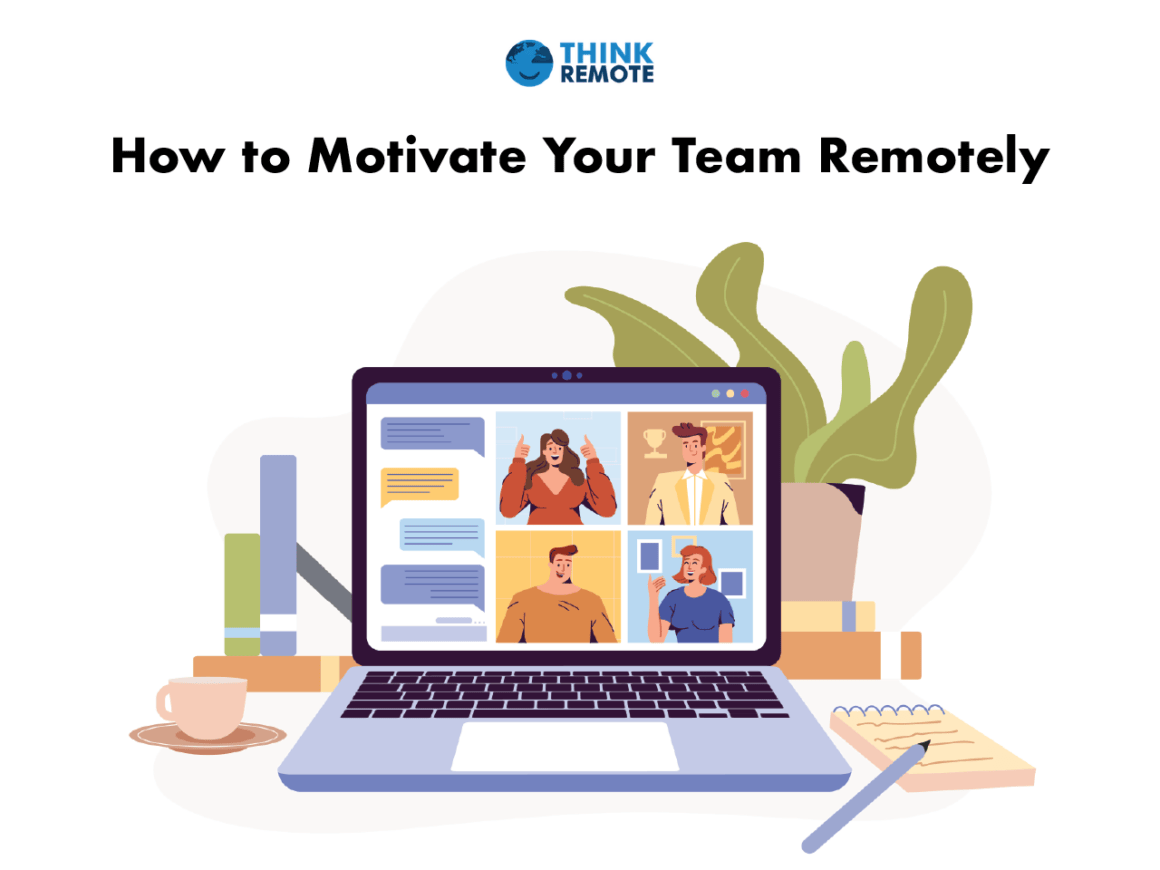Years ago, business leaders thought motivation was mostly about what they gave to their employees. Benefits such as beer pong Fridays, cash incentives, and gifts were always considered the best ones to boost motivation and productivity. However, with remote work, leaders had to re-think how they motivated their teams. Instead of giving, motivation became more about building a sense of purpose in the team and company.
If you’re wondering how to motivate your team remotely, you should take a second to think about what your employees truly value. Is it more flex time? Being able to balance their lives better with work? Or is it gym passes and snack bars?
Let’s understand first why motivation is key for employees and what ways are effective to motivate remote employees.
Why Motivation is Key for Remote Employees?

No one likes doing things because they feel they have to. When employees feel their work is an obligation, while they can still do it, primarily because of the paycheck, results won’t be nearly the same as if they felt a sense of purpose.
Employee motivation becomes a key element in the workplace as it relates to the commitment and energy they bring to their role daily. Without motivation, companies experience high rotation rates, reduced productivity, and overall lower levels of output, making it harder to reach important goals.
Motivation might seem even more challenging when working with virtual teams, as you’ll need to figure out how to build this sense of purpose 100% remotely.
Motivating remote employees will help you establish a sense of belonging and make it easier for your team to collaborate and feel close to one another despite the distance.
How to Keep Your Team Motivated Remotely? 13 Ways
How do you energize a remote team?
Sometimes it is not only about learning how to motivate remote employees but also about making this feeling stay over time. Kind of like a permanent motivation. Here are 13 ways to do this!
1. Make Sure they Have The Right Equipment
The beauty of remote work is that you don´t need much equipment to do your job. However, with time you start learning how an ergonomic chair makes all the difference. Or how a good pair of headphones or a second monitor boost your productivity.
A way to motivate your remote team is by ensuring they have everything they need to perform their tasks. Whether it’s a mouse pad or a wireless keyboard, a small detail will make them feel valued.
2. Communicate!
There´s a fine line between encouraging communication and being a micromanager.
While video calls are a great method to connect with employees, async communication is also effective. This will depend on your team dynamics, but checking in daily can be a simple message like “hey, let me know if you need anything related to x project” or “I think this could work for Y task.”
When giving tasks or projects, explain why these are important, what´s the main goal, and the expected results. That way, they can see firsthand why their work matters and give them an extra reason to work even harder.
3. Meaningful and Unexpected Gifts

Little details have a big meaning. For example, if you work in a team of writers, a simple detail such as an inspirational quote framed can make a big difference. In our case, this is exactly what happened; each content team member had this quote as a reminder of how to become a great writer.
A mug with a funny quote, or even a delicious snack, can brighten your remote team´s day and make them value being part of your team.
4. Encourage Them to Grow Professionally
It doesn´t matter if you lead a team of developers, writers, accountants, or sources; everyone has something to learn. Careers are quickly evolving, and the worst thing is to stay behind. There are always ways to grow and develop professionally.
If you see someone on the team interested in learning or acquiring a new skill, encourage them by offering a paid course, mentorship, or the right resources.
5. Provide Actionable Feedback
In terms of how to keep a team motivated, the answer is simple: Feedback. Both positive and negative feedback are powerful tools to break bad habits and strengthen positive behaviors.
When someone in the team is doing a great job, it’s valuable that you let them know. In some cases, they might not even be aware of this. On the other hand, if they could perform certain tasks better or if you´re not happy with the results, then having a feedback meeting to discuss this is fundamental.
Negative feedback, believe it or not, can be a motivation booster. But it depends on how you conduct these meetings. It’s not about sugarcoating and trying not to hurt your employees’ feelings. It’s about being honest and direct, but with tact. Remember, we´re all learning. So the idea is that you provide constructive feedback that they can implement. This will lead them to build confidence over time and learn from their mistakes.
6. Take Mental Health and Burnout Seriously
According to Mind Share Partners, 42% of global employees experienced a decline in mental health since the pandemic began.
Talking about mental health is not easy, and it can be uncomfortable. However, when employees deal with too much work stress, they can develop other psychological problems such as anxiety and depression.
There are many ways to prevent burnout in your team, and start taking mental health as a priority. For example:
- Monthly anonymous surveys to check out how employees overall are feeling is one of these solutions.
- Check-ins with every team member
- Offer them mental health benefits like psychologists, meditation classes, yoga, etc.
- Be flexible. When an employee is going through a difficult time, encourage them to take time off or to work fewer hours, anything to let them know you care.
- Be vulnerable. Being honest about mental health up opens the door for others on the team to feel comfortable taking with you.
7. Implement an Employee Recognition Program
How to motivate employees working from home? Recognize their hard work. Employees who get recognized for their accomplishments are generally happier and more productive. And it also encourages them to stay longer in a company.
According to Indeed, 30% of people who left a job within six months said being recognized more for their contributions could have helped them stay longer.
Some ways to implement an employee recognition program are through:
- Virtual award ceremony where employees who have contributed get to be in the spotlight.
- Happy hour – If you have team members who live in the same city, you can make a small reunion to appreciate all the hard work.
- Employee recognition virtual wall – depending on the tools you use, you can build a virtual wall (For example, a Slack channel) where you add every month “Employee of the month”
- Monetary awards – bonuses, gift cards, a meal, a cool office gadget.
8. Virtual Team Building Activities
One of the challenges remote teams face is isolation. It’s easy to feel lonely when you don´t interact face to face. However, with team-building activities encouraging teamwork and collaboration is easier. It helps team members realize that while they work remotely, they still have a team, and everyone is working towards the same goals.
Team building activities, however, become a burden when they are too forced.

Before making the mistake of trying to force these activities, ask your team what they would like to do. In some cases, video gaming nights work like magic. Other teams love trivia, wine nights, or coffee meetings.
9. Health Benefits
What does your company offer that others don’t?
Now that remote work has become the mainstream; the competition keeps increasing. One day you can hire a skilled employee but lose them in a heartbeat if you don´t offer solid benefits.
With the Covid-19 outbreak, health is something that gained more and more priority. Offering health insurance to remote employees is something not all companies do, so it is highly valued.
10. Get Personal
You manage a team, but a team of individuals. While team-building activities and meetings are a great way to foster connection and motivation, it’s equally important to talk to each team member individually.
Not only to check how they are doing in terms of tasks but also to get to know each of them better. Perhaps you both are fans of Friends and have a lot more in common than you imagine!
Being closer to employees will help you understand their needs better and to build trust easier.
11. Trust Your Team
Motivating your team remotely is impossible without trust. Why? Because trust is what makes employees feel safe, decreases stress levels, and overall it increases the willingness to stay with a company.
When your team feels you trust them, they feel more capable of doing their tasks. However, if you´re continually supervising and correcting them, they will start burning out and feeling that what they do is never good enough for you.
Building trust remotely is as simple as starting actively listening to them, delegating tasks, showing appreciation, and being always honest when it comes to results and expectations.
12. Show Them How Important is the Work They Do
It’s easy to feel unmotivated when you don´t know the impact of your work. Just think about this for a second; if you had no idea about results or progress, how would you measure success? Or goals accomplished?
This happens with your employees sometimes. While you lead the team and oversee projects ensuring you meet every goal, they might not know how the work they do relates to these goals.
Making them realize how their tasks contribute to the project and to the results will help them see the bigger picture. Every task they do matters, so it’s fundamental to show them how and why it matters.
13. Make Time to Play
During work hours, engaging in activities that differ from working can sometimes bring great benefits. You can increase creativity, productivity, and collaboration – especially around holiday time. Sometimes employees spend so many hours stuck in a project that they start feeling overwhelmed.
Whenever this happens, you can have strategies up your sleeve to motivate them remotely. These activities can happen both as team-building activities and on an individual level. For example, If an employee loves painting, you could gift them a painting set and encourage them to paint whenever they feel stuck with something.
Playing is fundamental; as Greg Mckeown explained in his book Essentialism that “when we play, we are engaged in the purest expression of our humanity, the truest expression of our individuality. Play expands our minds in ways that allow us to explore: to germinate new ideas or see old ideas in a new light.”
It All Comes Down to One Thing: Caring
When you care about your team, you will make sure they have everything they need to perform exceptionally.
In the end, motivation is about caring. Because you can give them the best home office set up, but if you´re not there for them when they need you, it won´t matter. By building trust, checking in from time to time, and helping them develop professionally, you´ll create a safe and vitalizing work environment that will motivate every single one of them.






